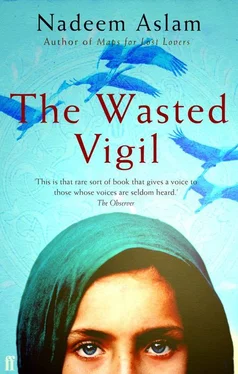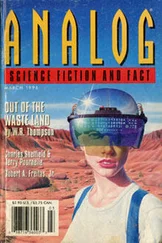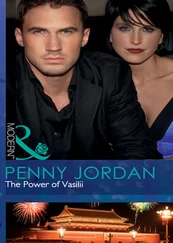Nadeem Aslam - The Wasted Vigil
Здесь есть возможность читать онлайн «Nadeem Aslam - The Wasted Vigil» весь текст электронной книги совершенно бесплатно (целиком полную версию без сокращений). В некоторых случаях можно слушать аудио, скачать через торрент в формате fb2 и присутствует краткое содержание. Год выпуска: 2009, Издательство: Faber and Faber, Жанр: Современная проза, на английском языке. Описание произведения, (предисловие) а так же отзывы посетителей доступны на портале библиотеки ЛибКат.
- Название:The Wasted Vigil
- Автор:
- Издательство:Faber and Faber
- Жанр:
- Год:2009
- ISBN:нет данных
- Рейтинг книги:4 / 5. Голосов: 1
-
Избранное:Добавить в избранное
- Отзывы:
-
Ваша оценка:
- 80
- 1
- 2
- 3
- 4
- 5
The Wasted Vigil: краткое содержание, описание и аннотация
Предлагаем к чтению аннотацию, описание, краткое содержание или предисловие (зависит от того, что написал сам автор книги «The Wasted Vigil»). Если вы не нашли необходимую информацию о книге — напишите в комментариях, мы постараемся отыскать её.
The Wasted Vigil — читать онлайн бесплатно полную книгу (весь текст) целиком
Ниже представлен текст книги, разбитый по страницам. Система сохранения места последней прочитанной страницы, позволяет с удобством читать онлайн бесплатно книгу «The Wasted Vigil», без необходимости каждый раз заново искать на чём Вы остановились. Поставьте закладку, и сможете в любой момент перейти на страницу, на которой закончили чтение.
Интервал:
Закладка:
He presses the button on the side of his flashlight and sends the thick ray into the air of the room he had entered a moment ago. Held within the light’s circle, the bird’s head remains motionless, though its eyes are open. Perhaps peacocks don’t close their eyes when they sleep. He lets the light flow down the body, leaving the diademed head and arriving at the blue and green tail. A quiver full of stiff jewelled arrows. As though the heat from the beam has brought it to life, the creature now sends a shiver into the long feathers, and the head flickeringly turns to look at him when he brings the beam back up. The bird has been resting in a deep niche and now stands up, making Casa think it is about to step onto the rod of silver light issuing from his hand. The diameter of light when he moves it around the room reveals other smaller birds, asleep on perches, on dead branches and dozens of wire swings. Every colour is represented, and there are various shapes of beak, various lengths of tail. Eyes like pearls. Some are mistaken by him at first glance for toys — the carved and moulded objects banned by the Taliban. As a child at the madrassa he had learned to whistle, much to the displeasure of the teachers who saw it as a kind of music, his mouth a sinful musical instrument they wanted to but could not find any way of destroying. Though he himself had no wish to be separated from the newly acquired skill, he became careful about when and where he practised it after repeated warnings to desist — imitating bird calls, the rhythm of the Koranic verses, the call to prayer. Inevitably he was caught and they sewed his lips together with needle and thread for four days.
He touches the scar on his upper lip. The place she had touched.
He knows why these birds are here. Gul Rasool, he has heard from Nabi Khan, keeps falcons and likes to feed them on the meat of elegant birds, enjoys seeing them tear into and scatter the brilliant feathers. Paying a high price to the owner if a bird is particularly beautiful. At one time there were three hundred falcons and a hundred thousand white doves to feed them.
At the brief sound of a chain he moves towards the far corner and finds a large wild boar tethered to the wall there. He had hunted them in the villages around Peshawar, lying in wait all night for them to raid the peanut fields, the eyes glowing amber in the darkness. The beast turns its thick neck and looks at him. Gauging the length of the chain, he maintains a distance of just over two and half feet from it. The memory coming to him of the times when, from the forests around an al-Qaeda training camp, he would capture jackals and yellow-gazed lynx and hare, and bring them to the camp laboratory where they died strange deaths in gas chambers.
Now there is another noise and he turns to see that the peacock is jumping out of its high niche and onto a log on the aviary floor. It disappears from the circle of light, Casa not following it because something else has caught his attention. There, behind a log, is an octagonal box with crescent-shaped brass handles on its sides. It is covered in white streaks because of the birds, but he can see that the Paradisal tree under which the throne of Allah is to be found is painted on it. The box in which the Englishman said his wife had kept her paintings? He opens the lid and finds the rolled-up tubes of paper, each held together by dusty, rotting Chinese silk. The box — its eight sides echoing the shape of the Throne — is filled to the brim with them, perhaps all ninety-nine names of Allah are still in here, discarded amid logs and branches and various useless items in the corner. With the light in his mouth he unrolls a picture. The All Seeing . He carefully puts it back, and as the tubes shift he sees that something else is also in there, an object of different dimensions. The hundredth name? A landmine detonating at this range would kill him certainly. It’s something spherical wrapped in a dark torn shirt, and when he sees that it is a man’s head he lets it drop in shock, the desiccated skin, the empty eye sockets, the dried-up nerves and blood vessels issuing from the torn neck, falling towards the floor out of the light beam. He is not sure whether he has let out a sound, a shout, but the torch is still there in his mouth, directed now at the wall, now at the ceiling, as he loses his balance and falls backwards, dust motes floating in the bright shaft. Somewhere in the darkness near him is that parchment-like face pasted onto the skull, the lips pulled back to reveal blackened teeth. Adrenalin still in him, he propels himself backwards with his feet, knees rising and falling, to be as far away as possible. With his back against the wall he manages to bring order into his breathing. The shirt is a Soviet soldier’s. He recognises it from the many bloodstained ones that can be found for sale in the bazaars of Peshawar and Kabul. He has heard how in the 1980s, convoys of ten-ton trucks filled with automatic rifles, with machine guns and grenade launchers, bought secretly by the United States, would come into Peshawar daily from the Arabian Sea docks of Karachi, and then move on towards the Afghan interior. In return, bloody fur hats and Red Star badges taken from dead Soviet soldiers were taken out of Afghanistan on mules for sale in Peshawar. When the Afghan guerrillas returned a prisoner to the Soviets in exchange for one of their own, they axed off his right hand so he would not be able to fight again, and these trophies too could be found in the bazaars.
He has often wished he had been alive back then, to be able to kill a Soviet soldier. But, he reminds himself on those occasions, I am alive now and able to kill Americans, infidels all.
The shirt is still in his hands. It’s just the front panel really, a rag black with blood, the sleeves ripped away, most of the back too, the collar hanging off. Throwing it sideways into a corner he moves towards the three steps that lead out of this room. They are made of rough wooden planks and each board had tried to make a different noise underfoot when he came in. He steps out without making a sound to find James Palantine and three other Americans looking at him. One of the Kalashnikovs is his. He had written onto its strap the verse from the Koran which lavishes praise on iron, the metal of swords and warfare.
*
The cloud is thickening above David as though someone wishes to hinder his progress by hiding his surroundings from him, by cancelling the meagre light from the thin moon. There’s barely a landmark for him as he drives towards Usha, the path firing a spray of pebbles at the car. Cloud cover and fog banks are to be some of the weapons the United States plans to use in the wars of the future, a summoning of hailstorms and lightning strikes against the enemy on the ground, the owning of the weather. Monsoon clouds above Laos and Cambodia were drenched with chemicals during the Vietnam War in order to prolong the rainy season, rendering Vietcong supply lines impassable.
He parks the car some way before Gul Rasool’s house and gets out and stands looking at the building from a distance. Those guarding it will make themselves known any moment. He can feel the weight of their eyes on him.
Who has her? Dunia told Lara that a man had come forward two days ago to claim to the people of Usha that she had once tried to seduce him. And yet it had been she who had rebuffed him after he, a toymaker, had attempted to gain her love with a doll he had sold her, a figure moulded from clay in which he had added his semen.
He walks along the high wall, towards the door behind which a light burns, showing through chinks, and he shouts out his name when he is told to halt.
‘I am here to see James,’ he tells the American man in the group that has gathered before him.
‘That’s far enough. He called you?’ This young man was at the house during the day, pulling down books while standing on a bridge of rope.
Читать дальшеИнтервал:
Закладка:
Похожие книги на «The Wasted Vigil»
Представляем Вашему вниманию похожие книги на «The Wasted Vigil» списком для выбора. Мы отобрали схожую по названию и смыслу литературу в надежде предоставить читателям больше вариантов отыскать новые, интересные, ещё непрочитанные произведения.
Обсуждение, отзывы о книге «The Wasted Vigil» и просто собственные мнения читателей. Оставьте ваши комментарии, напишите, что Вы думаете о произведении, его смысле или главных героях. Укажите что конкретно понравилось, а что нет, и почему Вы так считаете.












